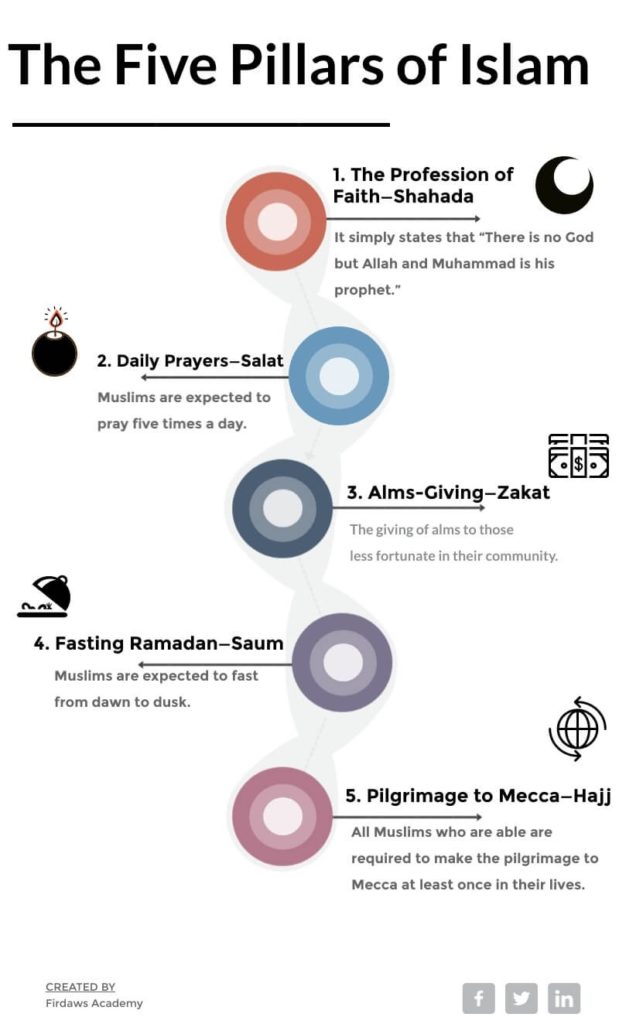
The third pillar of Islam
3. Alms-Giving—Zakat (Charity)
Zakat is the compulsory giving of a set proportion of one’s wealth to charity. It is regarded as a type of worship and of self-purification. Zakat is the third Pillar of Islam.
Zakat does not refer to charitable gifts given out of kindness or generosity, but to the systematic giving of 2.5% of one’s wealth each year to benefit the poor.
Charity (Zakah)
The categories of wealth upon which Zakah is obligatory are four:
1) freely grazing livestock;
2) produce;
3) moveable valuables (i.e. gold, silver, and
paper money etc);
4) trade items.
Zakah is obligatory if five conditions are met:
1) Islam;
2) freedom from slavery;
3)ownership of the ““Nisaab” (amount upon which Zakah becomes due);
4) complete and
stable ownership;
5) completion of a year, except in the case of produce.
The Zakah of freely grazing livestock is of three kinds:
camels; cattle; goats and
sheep. The Zakah on them becomes obligatory on two conditions:
1) The animals are
free grazing for a year or more;
2) They are for kept milk and reproduction and not
tor work. If they are for sale or trading, they are then considered trade items.
More than 120 camels:
for every 40, a two-year old she-camel is due; and for every
Less than 30 cows: there is no Zakah on them.
30-39 cows one. oneyearold calf’
40 ~ 59 cows: one, two-year old calf.
Zakah of Sheep and Goats:
Zakah on Land Produce:
It is obligatory upon three conditions:
1) The produce
could be measured by amount and stored, like barley and wheat of grains and like
raisins and dates of fruits. But that which is not measured by amount and stored, like
fresh vegetables and legumes, have no Zakah;
2) It reaches the minimum amount.
(Nisaab), which is 653 kilograms;
3) The person who will pay the Zakah has the
produce in his possession at the time when it is obligatory to pay Zakah, i.e., when
the signs of npeness show on the fruit and crops and they are ready for harvest.
The Zakah on Agricultural Products:
# Products that are produced without
efforts of irrigation, thus being the product of rainwater or free flowing streams and
springs, have a Zakah rate of 10% (1/10 ‘”). # The Zakah on agricultural products
produced by effort and labor in irrigation is 5% (1/20th). # That which is partially
by effort and partially without, is according to the greater of the two; the counting
would be according to the number of the days that effort and labor is used.
The Zakah on Moveable Valuables:
1) Gold: Zakah is due on gold only when it reaches 85 grams;
2) Silver: Zakah is due on silver only when it reaches 595 grams.
Zakah is due on money in any of its forms and currencies (e.g., bank notes)
when its value is equivalent to the amount of the gold or silver mentioned above.
Since the prices of gold and silver vary from time to time and from country to
country, Zakah should be based on whichever of the two works out better for the
poor. The Zakah on moveable valuables and money is one fortieth, 1/40 (2.5%).
Jewelry and ornaments that are for daily use have no Zakah on them. However,
what is used for trade and savings must have the Zakah paid on them. It is allowed
for women to wear what is customary of gold and silver jewelry. It is allowed to put
a small amount of silver on utensils, and it is also allowed for men to have a small
amount of silver in the likes of a ring and glasses.
Gold is prohibited to have on utensils and it is prohibited for men except a
minute amount in something that is used for some other purpose, like a button or a
gold tooth, without them resembling women.
If a person has wealth that fluctuates, increasing sometimes and decreasing at
others, then he should specify a day when he takes inventory and calculates his
wealth and pays the 1/40 ” (2.5%) on that, even if a year has not passed.
Those who are salaried or who have fixed incomes from rental real estate properties,
for instance, have no Zakah due on them unless they save some of that
amount. They must pay the Zakah of the saved amount if a complete year passes
while the saved amount is in their possession. If it is difficult to calculate, They
simply choose a day to reckon their account as mentioned above.
Zakah on Debts:
If a person loans some money to a rich person, or if the debtor
has sufficient funds and it is possible to get the money back from him, the Zakah for
that loan is to be calculated and paid when the money is recovered for each of the
years that lapsed, even if they are many.
But if the debt is with someone who is bankrupt, there is no Zakah due since the
person is not certain about its recovery and has no control over it.
There is no Zakah for trade items except with four conditions:
1) That the
payer of the Zakah owns them;
2) That he intends to trade with them;
3) That they reach the minimal amount, which is like that of gold and silver (whichever is lesser);
4) That a year has lapsed while these items are in his possession.
If these four conditions are fulfilled, he must pay the Zakah due from the value of the inventory.
If the items do not reach the minimal amount of Zakah and the person is in possession of gold, silver or other money, he adds them to the value of the trade items to reach the minimal amount.
If one intends to use the trade items for private use, like clothes, house and car, there is no Zakah due on them.
If he changes his intention (decides to use the items for trade again), he calculates the year from the time he changes his intention.
Zakat-ul-Fitr:
It is obligatory on every Muslim who has food that is surplus to his needs and the needs of his family members on the last night of Ramadan and Eid Day.
Zakat-ul-Fitr is two and a quarter kilos of staple food of the country in which
it is being given. This amount is per person, male or female, and his dependants.
It is beloved to give it out on the Eid Day before the prayer of the Eid. It is not
allowed to delay it past the prayer of the Eid but one may give it out a day or two
before Eid. One may also give to one person an amount of food that is enough for a group and vice versa.
It is obligatory to distribute the Zakah immediately as it becomes due and the
guardian is responsible to give Zakah on behalf of children and the insane.
It is Sunnah for the responsible person to distribute it personally and let it be known
to the people. Intention for the person on whose behalf the Zakah is given is necessary.
It is important to note that voluntary charity would not suffice for obligatory
Zakah, even if the person gave all his wealth away.
It is preferable to give the amount of Zakah to the poor of the country where the
person lives but in case of some overwhelming need, sending it to other countries 1s
also allowed. Giving Zakah two years in advance is proper and allowed, if the
wealth reaches the amount where Zakah becomes due.
People who deserve Zakah:
1) For the poor and utterly destitute;
2) For the poor who are needy;
3) For the officials
who collect and distribute it;
4) For those who need additional attraction to Islam,
whether Muslims or non-Muslims;
5) For the liberation of slaves and captives;
6) For helping people who are burdened with legal debt;
7) For those who are struggling in the way of Allah in Jihad; $8) For the travelers who are cut off from their homeland.
They are to be given according to their need except for the officials who work to collect and distribute the Zakah, since they are given according to a fair and agreed upon salary, even if they are rich.
It fulfills the obligation to hand over the Zakah to the Khawarij (a group of Muslims
who dissented from the companions of the Prophet (pbuh) and Bughaat (those who
rebelled against a righteous Imam) and the likes if they take control and rule the land.
It fulfills the obligation if the ruler takes the Zakah by force or by one’s consent,
and whether he is a just or an unjust ruler.
It does not fulfill the obligation to give the Zakah to a non-believer (other than those who need additional attraction to Islam), a slave, rich person, one’s dependents, or a member of Bani Hashim (descendents of the Prophet.
If after giving the Zakah to an undeserving person out of ignorance the person
comes to know about it, his obligation is not fulfilled except for the case that he gave
to someone thinking that the person was poor and later on found out that he was rich.
Voluntary Charity:
The Messenger of Allah said “Verily, what reaches a believer of his good deeds after his death is: knowledge that he taught and publicized; a pious son who supplicates for him; a book of Qur’anic script
(Mus’haf); a Mosque that he built; a rest house that he built for the travelers; a water canal that he made; and any charity that he spent while healthy and alive; all this will reach him after his death.” (Won Maajah).
For explaining the first pillar of Islam (Shahadah) Please, click here
For explaining the second pillar of Islam (Prayer) Please, click here
For explaining the Third pillar of Islam (Charity) Please, click here
For explaining the fourth pillar of Islam (Fasting) Please, click here
For explaining the fifth pillar of Islam (Pilgrimage) Please, click here

Ma sha Allah, very good